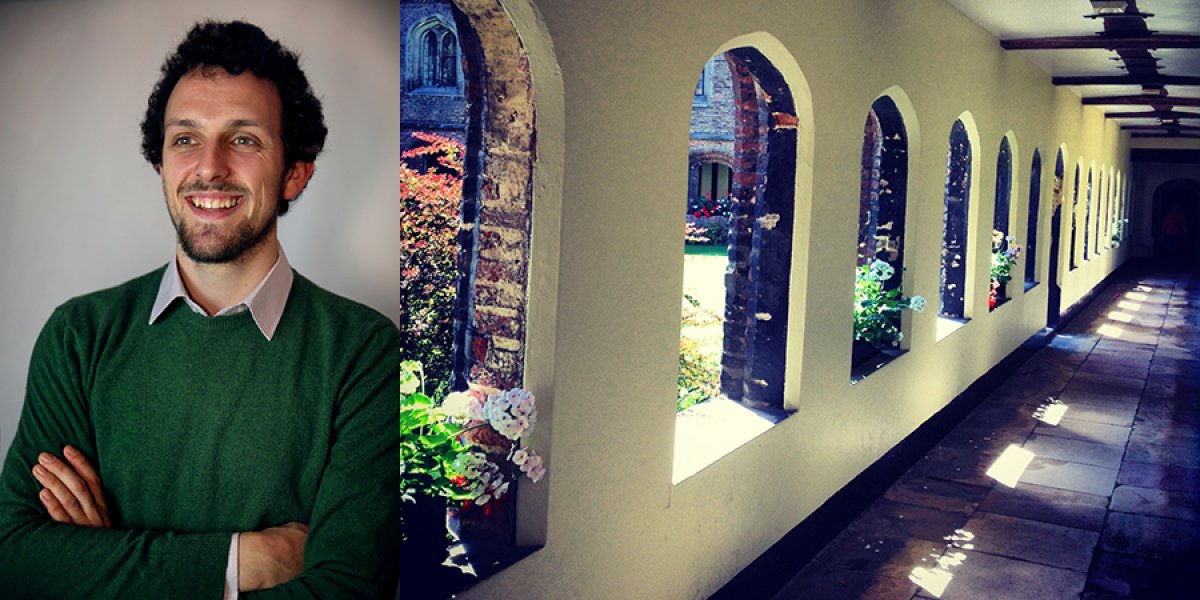Small players, big changes: why I chose a start-up over the UN - Sebastian Manhart
Sebastian Manhart (Queens' 2014) explains why he turned down working for the UN in favour of a non-profit tech start-up.
I have at least double the hours and earn a fraction of the pay, but I get out of bed every morning with a big smile on my face, loving the work I do and the impact I can have with it.
When I moved to Cambridge to enrol for an MPhil in Development Studies, I had a clear plan: I would learn from some of the world's greatest academics, network my way through the wide range of social events on offer, and, most importantly, land a job at the United Nations (UN).
Ever since I started becoming interested in international development, the United Nations seemed like the ideal place to work: agencies that cover every aspect of international cooperation, a highly cosmopolitan work place, and a great reputation – essentially the right place to make an impact.
Pathways and doorways
While I had a clear plan, the path to reach my goal was more tedious than expected: unanswered applications, long reply times, unattractive entry level positions, and stiff competition. In total, I sent out 34 applications of which, based on some conversations I had with senior UN employees, the large majority probably ended in a bin without even getting looked at.
In addition to the official application pathway, I tried to get my foot into the back-door of the UN system. For this purpose, I can´t imagine a better place than the University of Cambridge: I attended dozens of talks and presentations by officials of various UN agencies. Over wine and nibbles, I managed to get the contacts I needed to get someone to look at my CV.
The radical change
While I was getting closer to achieving my objective, however, I also started becoming more disillusioned with the idea of working for the UN itself. In private, several UN officials discouraged me from joining an organisation they described as 'bureaucratic', 'slow-moving', and 'highly-politicised', where I would be a very small cog in a huge machine.
Just in time, when I finally received an offer for a job at the UN, I had come to the conclusion that I needed a radical change. I accepted the offer, but decided to reach out to Toby Norman, the CEO of Simprints, a non-profit technology start-up based in Cambridge, whom I had seen giving a talk many months earlier at a Cambridge University Entrepreneurs event.
We had a chat, then an interview, and he decided to give me a shot as a summer intern in business development. Six months later, I am still in the beautiful 14th century castle in Chesterton in which Simprints is located. As you might be able to guess, I never took up that lucrative UN job that I had worked so hard to get. Instead, I have at least double the hours and earn a fraction of the pay, but I get out of bed every morning with a big smile on my face, loving the work I do and the impact I can have with it.
Starting-up
The really interesting thing to note is that start-ups, more specifically social enterprises which focus on maximising impact rather than profit, did not appear as an option once during my degree or the career fairs I attended. It is often assumed that big change has to come from big players, like the UN. I stumbled into this job by accident and I wish more students would be aware of the great potential, and rewards, that a non-conventional graduate job can bring.
Simprints is a non-profit tech start-up based in Cambridge, building hardware and software for biometric identification in developing countries. Backed by the Gates Foundation, UKaid, USAID, ARM, and others, it is developing a low-cost, rugged fingerprint scanner as well as an open-source app to enable community healthcare workers in developing countries to link patient records collected via mobile phones to a unique identifier. In 2016, Simprint's products will improve the delivery of healthcare for more than 55,000 people and, in 2017, are expected to reach 2-3 million people.
And Simprints is not alone: there are dozens, if not hundreds, of social enterprises in the UK that use the principles of market demand and private sector efficiency to tackle some of the most pressing problems we are facing today. The benefits of such an approach are clear: if there is no demand for your product and you are building something that won't actually be used, your company will perish. If, on the other hand, you develop a product that fits a real social need, you can scale quickly, side-skipping bureaucratic processes and maximising impact.
The start-up mindset
On an individual level, working for a start-up is not for everyone: my job is no '9-5'. The hours are very long, the pace unbelievably fast, and the material benefits negligible. For those who can live with these conditions, the rewards are immense: wide-ranging responsibilities, previously unconceivable personal growth, and, most importantly, tangible impact on the lives of some of the most disadvantaged people in the world.
Two months into my job, I was already in a slum in Dhaka, Bangladesh, working with the world's largest and probably most effective non-governmental organisation, BRAC. A month later, I pitched for £500,000 in front of several impact investors and 300 people at the 'Emerge Conference for Social Entrepreneurship' at Said Business School in Oxford, and, just last week, I started a project leading a team of nine London Business School MBAs, who are doing an eight-week pro-bono project for us.
A bright future
If the past six months are any indication, I expect 2016 to be the most rewarding year of my life. Working in a start-up like Simprints means I never know where I will be and what I will do in three months' time, an exciting and scary thought that makes this job the best I could have wished for straight out of university. For anyone who is still studying and contemplating to go down the standard path that you envisioned, I have a simple piece of advice: spend two months in a successful start-up. There are only two possible outcomes – either you hate it, and know for good, or you get addicted to the pace, the culture, the ownership, and you will never want to work somewhere else.
Sebastian has an MPhil in Development Studies. He attended Queens' College.
If you would like to submit your own alumni story, send us an email for details of our submission guidelines.
This article has been written by Sebastian Manhart and the opinions expressed are those of the author.

